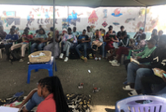Je, una ndoto kubwa?
Kuna makanisa ya kigothi barani Ulaya ambayo yalichukua zaidi ya miaka 600 -- zaidi ya vizazi 20 -- ili kukamilisha ujenzi!
Ingawa Piramidi kubwa zaidi ya Giza imejengwa kwa kasi (ndani ya kizazi kimoja), ila pia ilichukua makumi ya maelfu ya watu.
Nchini Tanzania, Msikiti Mkuu wa Kilwa Kisiwani ulijengwa katika karne za 11-14, ukajengwa upya baada ya tetemeko la ardhi, na uliendelea kufanyiwa ukarabati hadi karne ya 18. Ulitajwa pia miaka ya 1300 na msafiri Ibn Battuta. (Je ulijua unaweza kuona Kilwa Kisiwani kupitia "ziara ya mtandaoni" yaani 3D Virtual Tour? Ona kiungo chini kwenye "Rasilimali")
Maajabu ya dunia, ya kisasa na ya kale, yalianza kama ndoto kubwa, ndoto ambazo zilichukua vizazi vingi kutimiza. Kila kizazi kiliendeleza kazi ya zamani na pia walitoa mchango wao kwa kubadilisha mipango ya siku zijazo.
Hivyo bhasi, kama unajaribu kufanya jambo kubwa -- jambo ambalo hakika litabadilisha ulimwengu - usitarajie litafanyika kwa siku moja. Na usijaribu kuijenga peke yako.
Methali Zinazohusiana:
Kiswahili:
Ukitaka kwenda haraka, nenda peke yako, ukitaka kwenda mbali, nenda na wenzako
Kifaransa:
Rome ne fu[t] pas faite toute en un jour
Kutoka kitabu cha Li Proverbe au Vilain kilichochapishwa takriban mwaka wa 1190
Kifaransa cha kisasa: Rome ne s'est pas faite en un jour
Maana yake: Roma haikujengwa kwa siku moja
Kichina:
冰凍三尺,非一日之寒
Mita ya barafu sio kwa sababu ya siku moja ya baridi
Kigaelic
Chan ann leis a’ chiad bhuille a thuiteas a’ chraobh
Sio pigo la kwanza linaloangusha mti






















